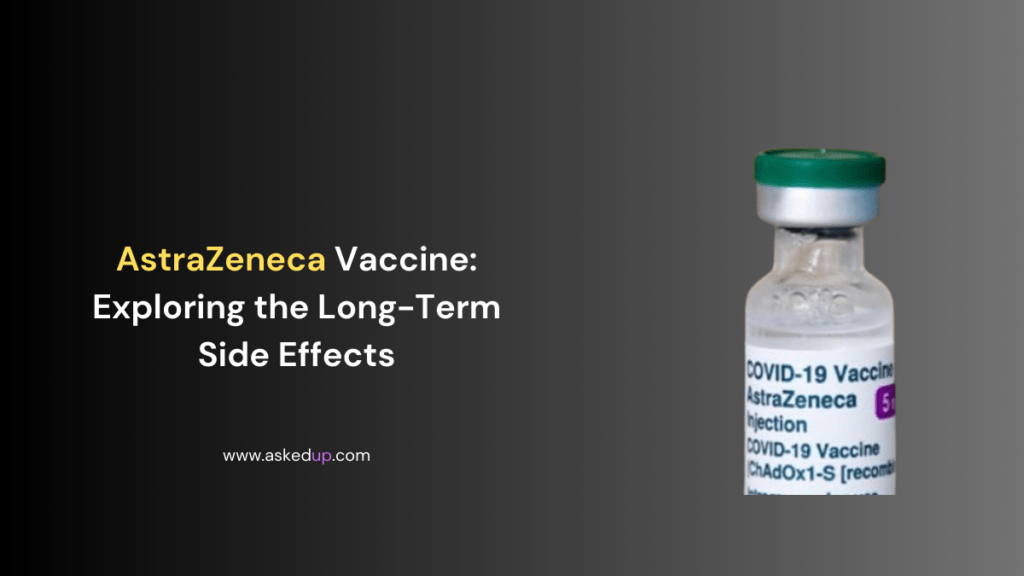Introduction
The AstraZeneca COVID-19 vaccine, developed in partnership with the University of Oxford, has played a crucial role in the global fight against the globe. However, as with any medication or vaccine, worry have arisen regarding potential long-term side effects.
In this article, we will delve into the available scientific evidence and address the key question around the long-term safety of the AstraZeneca vaccine.
Understanding the Vaccine’s Mechanism
Before looking at the potential long-term side effects, it is important to understand how the AstraZeneca vaccine works. This vaccine utilizes a harmless, weakened version of a common cold virus (adenovirus) from chimpanzees. The adenovirus carries the genetic instructions for the SARS-CoV-2 spike protein, which the virus uses to enter human cells. When the vaccine enters the body, it stimulates an immune response, prompting the production of antibodies and T-cells to recognize and fight the virus.
Reported Short-Term Side Effects
Like any vaccine, the AstraZeneca shot can cause some short term side effects. The most commonly reported side effects include:
- Pain, redness, or swelling at the injection site
- Fatigue
- Headache
- Muscle pain
- Chills or fever
These side effects are generally mild to moderate and typically resolve within a few days. They are signs that the vaccine is working and the immune system is responding as intended.
Long-Term Side Effects: What We Know So Far
While the AstraZeneca vaccine has been extensively studied for its safety and efficacy, long-term data is still being gathered and analyzed. Here’s what we know so far about potential long-term side effects:
- Blood Clotting Disorders
One of the most widely discussed concerns regarding the AstraZeneca vaccine is its potential link to rare blood clotting disorders, such as cerebral venous sinus thrombosis (CVST) and splanchnic vein thrombosis (SVT). However, it’s important to note that these events are extremely rare, occurring in approximately 1 in 100,000 to 1 in 1 million vaccinated individuals.
The risk of developing blood clots from COVID-19 infection itself is significantly higher than the risk associated with the vaccine. Ongoing research is for better understand the mechanisms behind these rare events and identify potential risk factors.
- Guillain-Barré Syndrome (GBS)
Another rare potential side effect is Guillain-Barré Syndrome (GBS), a rare neurological disorder in which the body’s immune system attacks the nerves. However, the risk of developing GBS after receiving the AstraZeneca vaccine is extremely low, and the condition is usually temporary and treatable.
Moreover, the risk of developing GBS is higher after contracting certain viral or bacterial infections, including COVID-19 itself.
- Myocarditis and Pericarditis
There have been a few reports of myocarditis (inflammation of the heart muscle) and pericarditis (inflammation of the outer lining of the heart) following vaccination with the AstraZeneca vaccine. However, these events are rare, and the risk appears to be lower than the risk associated with COVID-19 infection itself.
Ongoing Monitoring and Research
It is important to note that the long-term safety data for the AstraZeneca vaccine is still being gathered. Regulatory bodies, such as the European Medicines Agency (EMA) and the World Health Organization (WHO), continue to monitor and review the safety data as more people receive the vaccine.
Furthermore, ongoing research is for better understand the potential long-term effects of the vaccine, as well as to identify any potential risk factors or subgroup that may be more susceptible to certain side effects.
Discover: How To Give Up Coffee Without Headaches
Conclusion
While the AstraZeneca vaccine has been associated with a few rare and potentially serious side effects, the overall safety profile of the vaccine remains favorable. The benefits of vaccination, including reducing the risk of severe COVID-19 illness, hospitalization, and death, far outweigh the potential risks for most individual.
However, it is crucial to continue monitoring the long-term safety data and to remain vigilant for any emerging concerns. Individuals should consult with their healthcare providers to assess their personal risk factors and make an informed decision about vaccination.
By staying informed, following the guidance of health authorities, and participating in ongoing research efforts, we can collectively work towards ensuring the safest and most effective use of the AstraZeneca vaccine in the ongoing battle against the COVID-19 pandemic.


